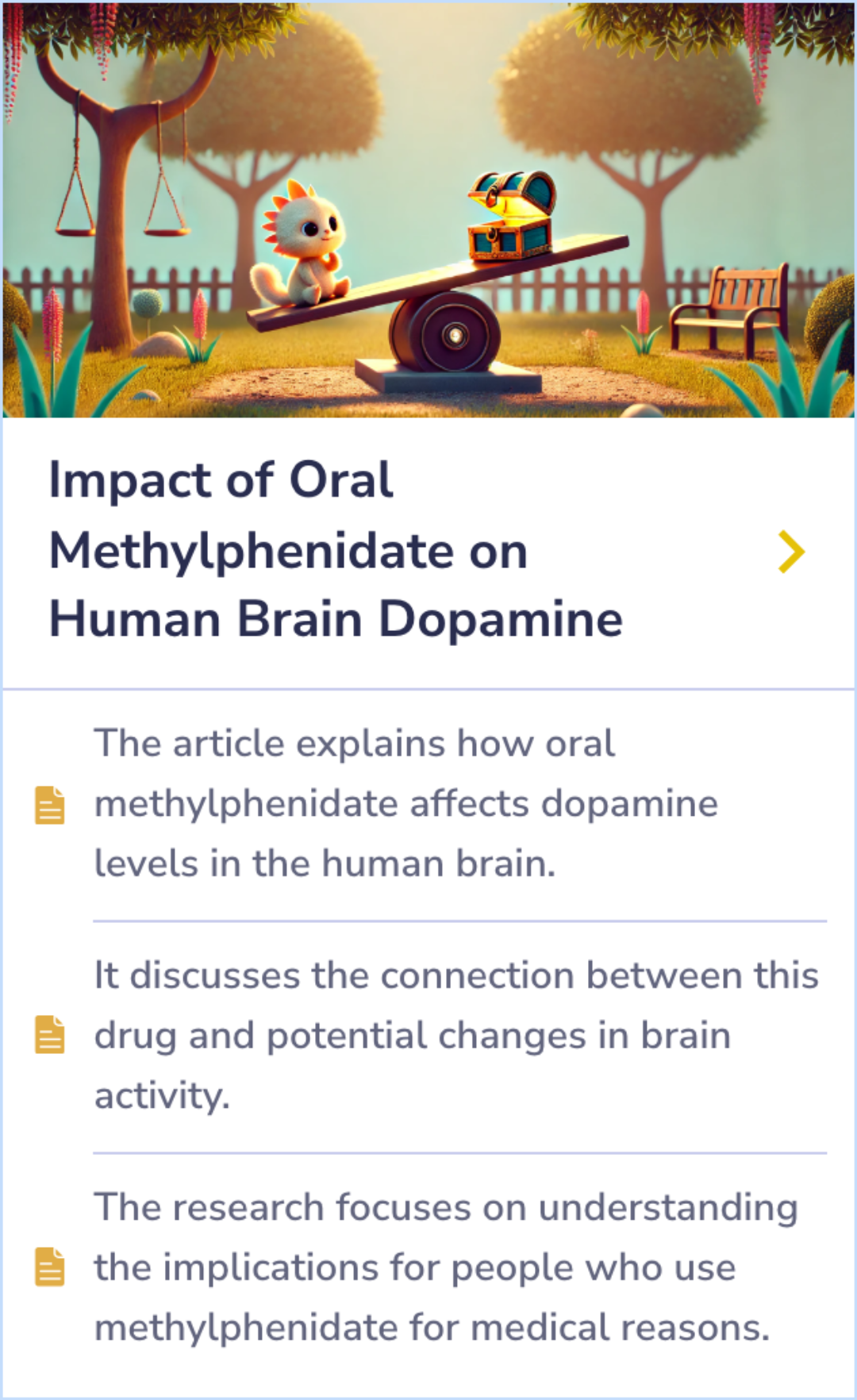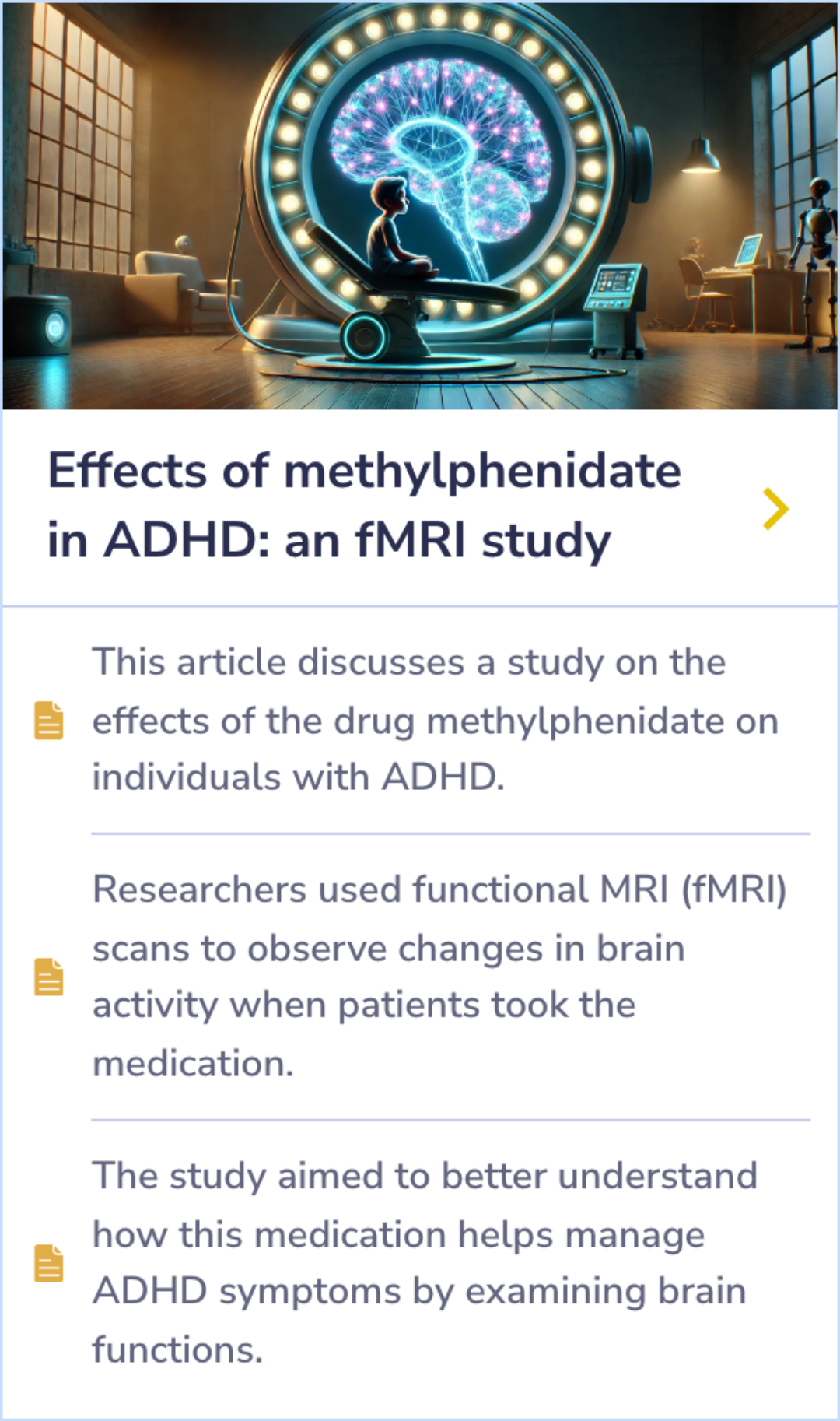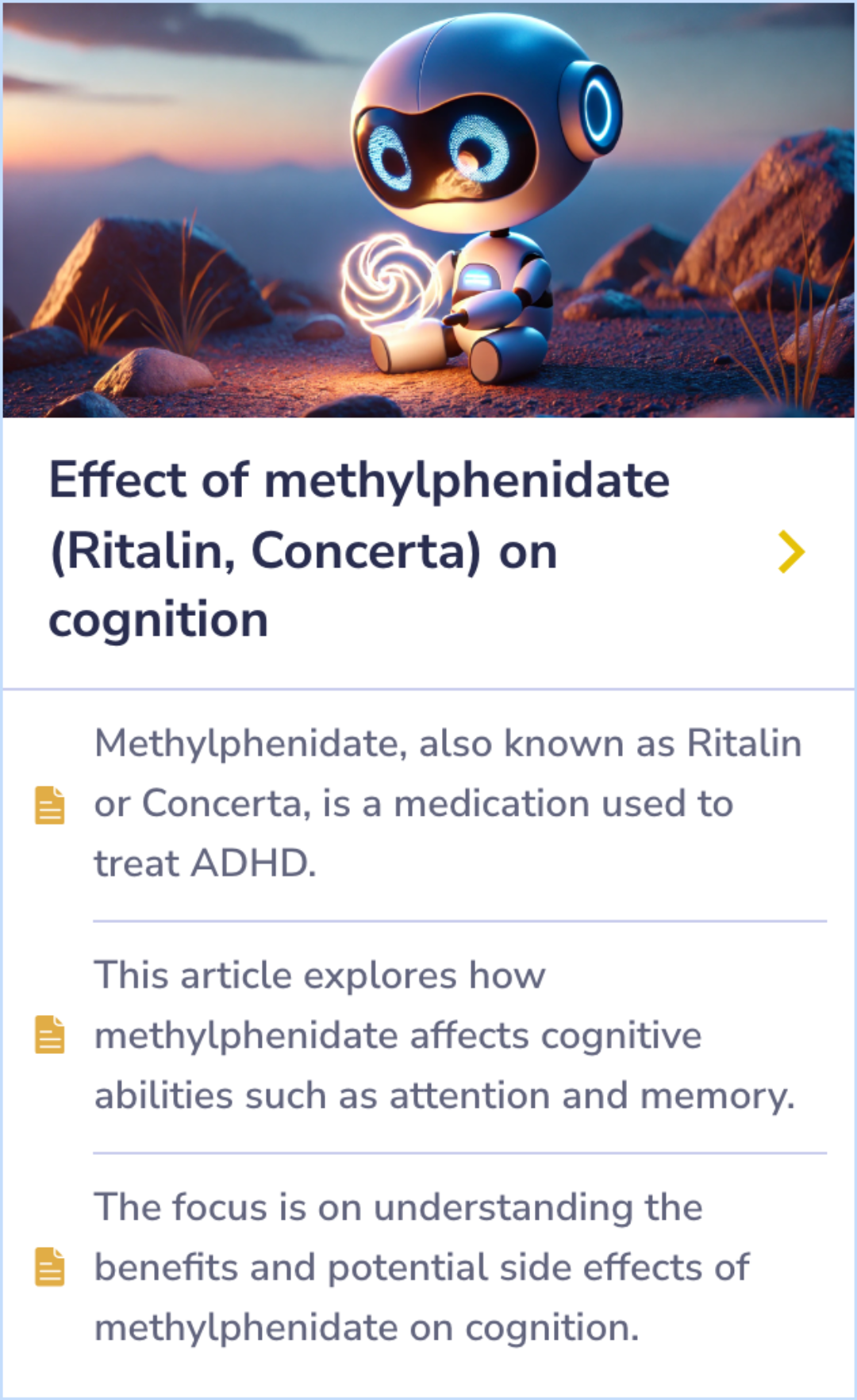Ritalin
Evidence Based Answers
Papers on the use of Methylphenidate (Ritalin/Concerta) Outside of ADHD
Research explores Ritalin’s use for concentration in healthy adults, cognitive recovery post-stroke, and managing cancer fatigue symptoms. Clinical support remains limited for these off-label uses.
Published: October 25, 2024
Click to explore a section:
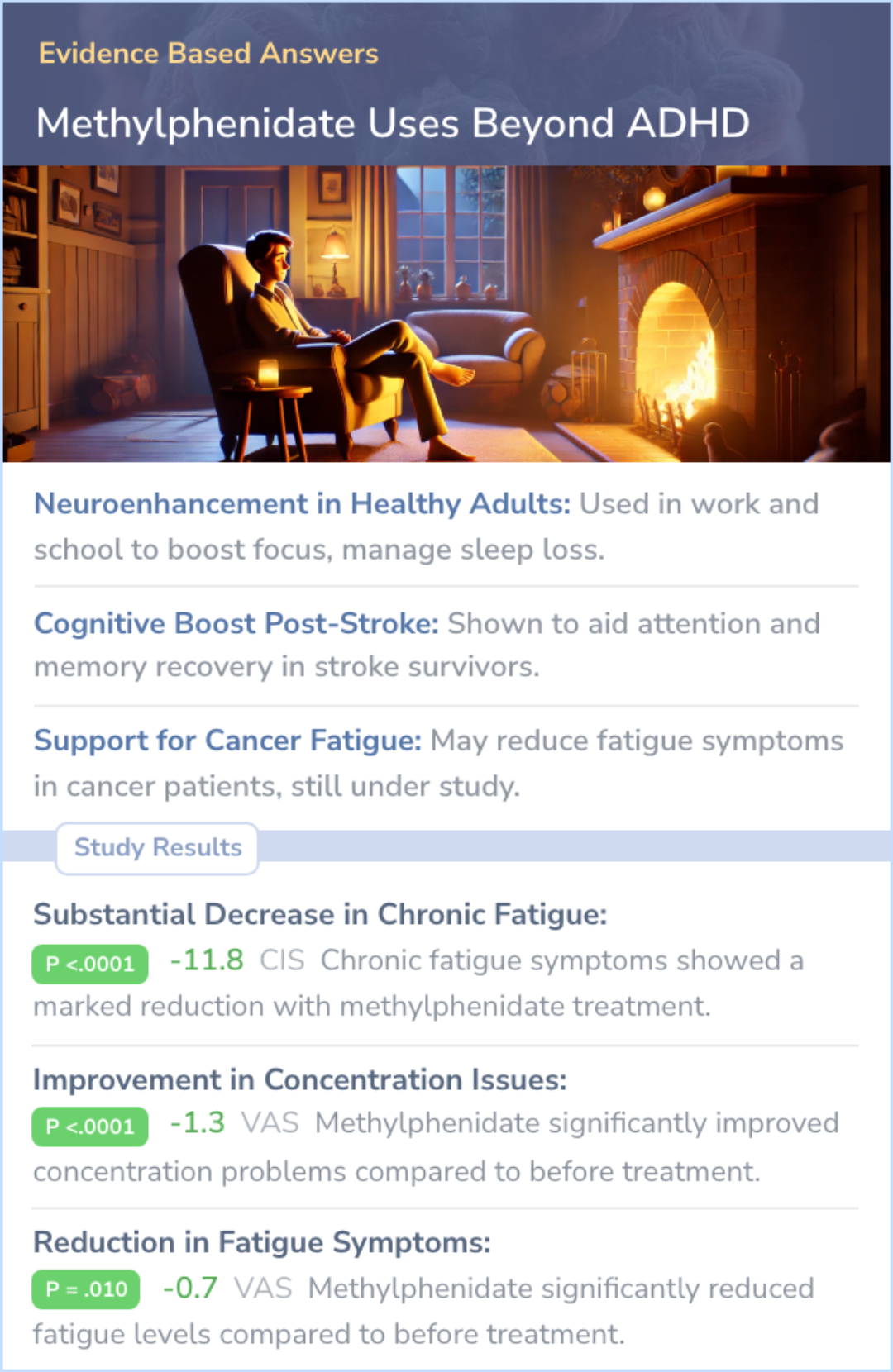
Studies show Ritalin aids focus, supports stroke recovery, and may reduce cancer fatigue symptoms.
Studies Summary
🧠
Improving Concentration in Chronic Fatigue Patients
Methylphenidate is studied for its effects on reducing fatigue and improving concentration in Chronic Fatigue Syndrome patients. Results showed a marked decrease in fatigue and concentration troubles compared to placebo, but only some patients had significant improvements.
🧩
Reducing Brain Activity on Tasks
In healthy adults performing cognitive tasks, methylphenidate decreased brain activity while improving performance, especially in areas regulating unnecessary mind-wandering. This effect was observed only during cognitive activity.
💊
Role in Amphetamine Reduction
Methylphenidate has potential in reducing intravenous amphetamine use in severely dependent patients, with a noticeable decrease in amphetamine-positive samples over the study period.
Highly Cited Studies
Long term Effects of Methylphenidate in Adults
Peer Reviewed Study 1
Methylphenidate's Impact on Fatigue and Concentration in Chronic Fatigue Syndrome
Peer Reviewed Study 2
Methylphenidate's Effects on Brain Activity During Cognitive Tasks in Healthy Adults
Peer Reviewed Study 3
Methylphenidate's Role in Enhancing Social Conformity in Non-ADHD Adults
Peer Reviewed Study 4
Using Methylphenidate to Reduce Amphetamine Use Outside of ADHD
Background: Methylphenidate's Role in Neuroenhancement
Methylphenidate is increasingly used by healthy individuals as a neuroenhancement drug, especially in academic and business settings. It is sought for improving concentration and managing sleep deficits.
However, the non-medical use of methylphenidate raises concerns, including the potential for dependence, side effects, and ethical issues. While it may offer short-term benefits, the long-term risks and consequences remain unclear.
However, the non-medical use of methylphenidate raises concerns, including the potential for dependence, side effects, and ethical issues. While it may offer short-term benefits, the long-term risks and consequences remain unclear.
“
Source Quotes:
Apparently, psychostimulants are popular among healthy people seeking neuroenhancement.
In an online poll conducted by Nature magazine, 20% of the 1400 responding readers reported use of MPH, modafinil, or beta-blockers for non-medical reasons.
Background: Methylphenidate for Post-Stroke Cognitive Decline
Methylphenidate, known by its brand names Ritalin and Concerta, has been studied for its potential to improve cognitive function in stroke survivors. These individuals often experience challenges with attention, working memory, and executive function.
Some research indicates that methylphenidate may help address these cognitive difficulties. However, it is important to note that using methylphenidate for this purpose is off-label, meaning it is not officially approved for stroke-related cognitive decline.
Some research indicates that methylphenidate may help address these cognitive difficulties. However, it is important to note that using methylphenidate for this purpose is off-label, meaning it is not officially approved for stroke-related cognitive decline.
“
Source Quotes:
Methylphenidate may be useful in the treatment of post-stroke depression (Lazarus et al. 1992; Grade et al. 1998).
Background: Methylphenidate's Potential in Managing Cancer-Related Fatigue
Methylphenidate has been explored as a treatment for fatigue in cancer patients. This fatigue can severely impact mood, cognition, and energy levels, making daily activities challenging.
Methylphenidate, a stimulant, may help alleviate some of these symptoms, but the evidence from controlled studies is limited, making it an investigational treatment at this stage.
Methylphenidate, a stimulant, may help alleviate some of these symptoms, but the evidence from controlled studies is limited, making it an investigational treatment at this stage.
“
Source Quotes:
In brain tumour patients following methylphenidate administration, significant improvements in subjective feelings of fatigue and mental dulling and the ability to engage in the usual activities of daily living have been observed.
Methylphenidate has been evaluated as a potential therapy for improving mood, cognition, and pain control in cancer patients.
Peer Reviewed Study
Study: Methylphenidate's Impact on Fatigue and Concentration in Chronic Fatigue Syndrome
This study investigated the short-term effects of methylphenidate, a stimulant typically used for ADHD, in patients with Chronic Fatigue Syndrome (CFS). The study included 60 patients and used a double-blind, placebo-controlled crossover design.
Results showed that methylphenidate significantly reduced fatigue and concentration disturbances compared to baseline and placebo. However, only a minority of patients experienced clinically significant improvements.
Results showed that methylphenidate significantly reduced fatigue and concentration disturbances compared to baseline and placebo. However, only a minority of patients experienced clinically significant improvements.
author
Blockmans D, Persoons P, Van Houdenhove B, Bobbaers H
journal
Am J Med
Date Published
2006 Feb
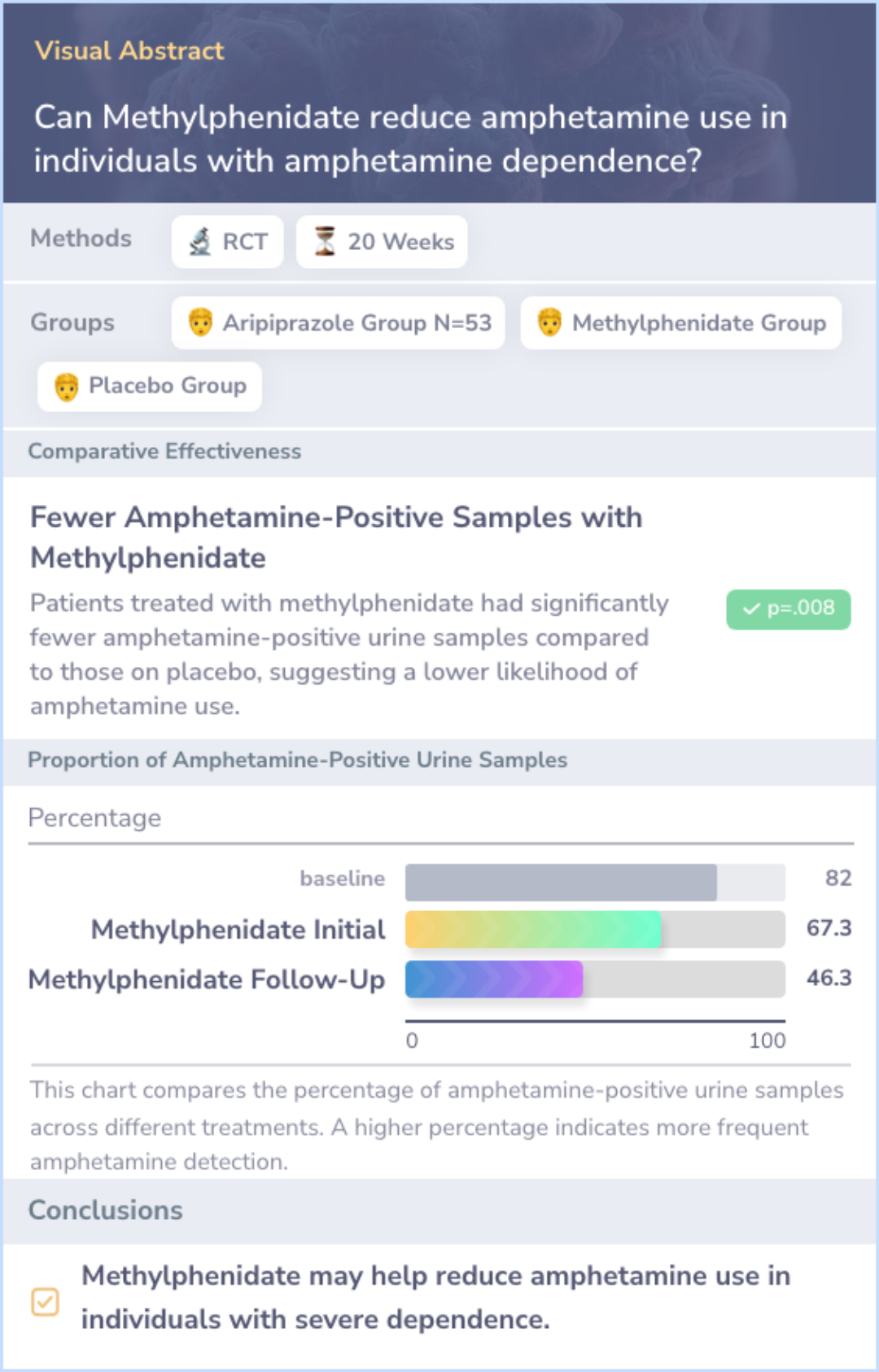
Peer Reviewed Study
Study: Methylphenidate's Effects on Brain Activity During Cognitive Tasks in Healthy Adults
This study explored the effects of methylphenidate (Ritalin) on brain glucose metabolism in healthy adults performing cognitive tasks. When participants took methylphenidate, their brains used significantly less glucose during the tasks compared to when they took a placebo. The drug appeared to reduce brain activity in areas involved in mind-wandering, which led to improved performance for some participants.
However, methylphenidate did not change brain metabolism when no cognitive task was given.
However, methylphenidate did not change brain metabolism when no cognitive task was given.
author
Volkow ND, Fowler JS, Wang GJ, Telang F, Logan J, Wong C, Ma J, Pradhan K, Benveniste H, Swanson JM
journal
PLoS One
Date Published
2008 Apr 16
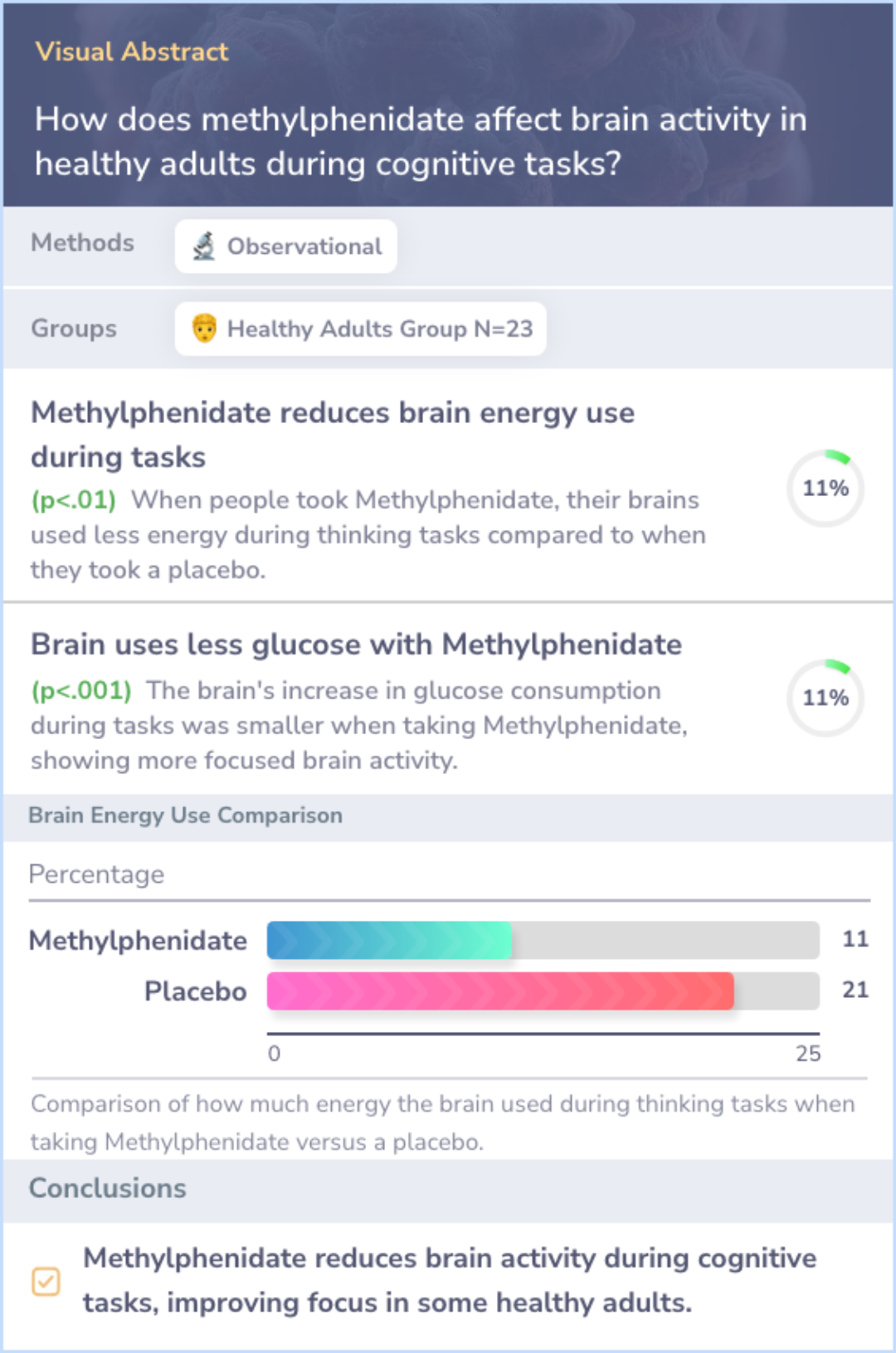
Peer Reviewed Study
Study: Methylphenidate's Role in Enhancing Social Conformity in Non-ADHD Adults
This study examined the effects of Methylphenidate (MPH) on social conformity in 38 healthy adult females. Participants rated the trustworthiness of faces, saw peer ratings, and then re-rated the faces after taking either MPH or a placebo. The MPH group showed twice the conformity effect compared to the placebo group, suggesting that MPH may enhance weaker social signals leading to increased conformity.
This effect was not observed when there were large conflicts in ratings, indicating MPH's role in enhancing only moderate social influences.
This effect was not observed when there were large conflicts in ratings, indicating MPH's role in enhancing only moderate social influences.
author
Campbell-Meiklejohn DK, Simonsen A, Jensen M, Wohlert V, Gjerløff T, Scheel-Kruger J, Møller A, Frith CD, Roepstorff A
journal
Neuropsychopharmacology
Date Published
2012 May

Peer Reviewed Study
Study: Using Methylphenidate to Reduce Amphetamine Use Outside of ADHD
This study explored the use of methylphenidate, typically prescribed for ADHD, in reducing intravenous amphetamine use among patients with severe dependence. Over 20 weeks, patients who received methylphenidate had fewer amphetamine-positive urine samples compared to those given a placebo. This suggests methylphenidate might help reduce illegal amphetamine use in cases of severe dependence.
Although the study was stopped early, the results indicate potential benefits of using methylphenidate outside of ADHD treatment.
Although the study was stopped early, the results indicate potential benefits of using methylphenidate outside of ADHD treatment.
author
Tiihonen J, Kuoppasalmi K, Föhr J, Tuomola P, Kuikanmäki O, Vorma H, Sokero P, Haukka J, Meririnne E
journal
Am J Psychiatry
Date Published
January 2007

Key Takeaways
Conclusions
Methylphenidate, commonly known as Ritalin or Concerta, is primarily used for ADHD, yet its potential extends beyond. Studies suggest it may aid concentration and reduce fatigue in Chronic Fatigue Syndrome but shows varied clinical significance.
In healthy adults, it alters brain activity during tasks but not at rest, potentially boosting task performance. Its effect on enhancing social conformity and reducing amphetamine use further highlights its capabilities outside ADHD.
Background studies accentuate ongoing research in cognitive impairments post-stroke, cancer-related fatigue, and HIV implications, underscoring the balance of evaluating potential benefits against risks in these diverse settings.
In healthy adults, it alters brain activity during tasks but not at rest, potentially boosting task performance. Its effect on enhancing social conformity and reducing amphetamine use further highlights its capabilities outside ADHD.
Background studies accentuate ongoing research in cognitive impairments post-stroke, cancer-related fatigue, and HIV implications, underscoring the balance of evaluating potential benefits against risks in these diverse settings.

Evidence Summary
How Oral Methylphenidate Affects Dopamine and Brain Activity
Oral methylphenidate directly influences dopamine levels in the brain, potentially altering brain activity. This research examines how these changes might affect people using the medication for various medical purposes. It dives into the relationship between methylphenidate and brain function, aiming to uncover its broader effects on users.
The findings provide insight into the medication's impact on the brain's dopamine system and what that might mean for users over time.
The findings provide insight into the medication's impact on the brain's dopamine system and what that might mean for users over time.
Evidence Summary
Methylphenidate's Influence on Brain Activity in ADHD
fMRI scans reveal how methylphenidate affects brain function in people with ADHD. By tracking changes in brain activity when patients take the medication, the study shows how the drug helps manage symptoms.
Brain function shifts under methylphenidate, offering insights into its impact on symptom management for ADHD. fMRI scans capture these shifts, connecting brain changes with medication effects.
Brain function shifts under methylphenidate, offering insights into its impact on symptom management for ADHD. fMRI scans capture these shifts, connecting brain changes with medication effects.
Evidence Summary
Cognitive Effects of Methylphenidate: Benefits and Risks
Methylphenidate, known as Ritalin or Concerta, is explored for its impact on cognitive functions like attention and memory. While primarily used for ADHD, its effects on cognition are also noted in other contexts, with both benefits and potential side effects highlighted.
The focus is on how this medication can influence cognitive abilities, revealing both positive outcomes and concerns about side effects.
The focus is on how this medication can influence cognitive abilities, revealing both positive outcomes and concerns about side effects.
